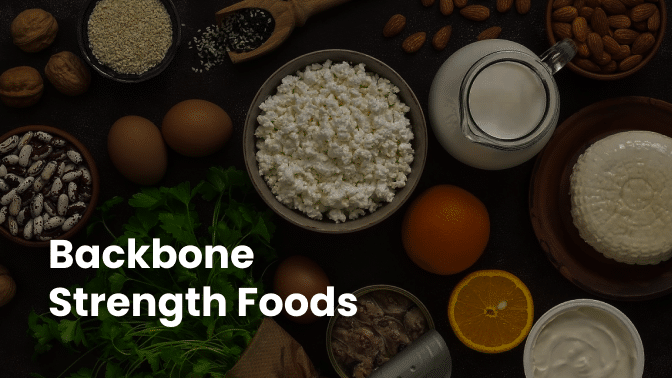Backbone Strength is essential for maintaining overall health and well-being. Our bones play a vital role in supporting our movements, protecting our internal organs, and storing essential minerals like calcium. As we age, our bones naturally start to lose density, making them more susceptible to fractures and breaks. That’s why it’s important to take care of our bones from an early age by eating a healthy diet rich in bone-strengthening nutrients.
Nutritional Requirements for Bone Health:
Our bones need a variety of nutrients to stay strong and healthy, including calcium, vitamin D, phosphorus, and magnesium. Calcium is the most well-known bone-building nutrient and is essential for maintaining bone density. Vitamin D helps our body absorb calcium, while phosphorus and magnesium are also important for bone structure.
Read Also: The Basics of Surgical Instruments – Dilating and Probing Instruments.
Some backbone strength foods includes:
- Dairy products: Milk, cheese, and yogurt are excellent sources of calcium, a key nutrient for maintaining strong bones.
- Leafy greens: Kale, collard greens, and broccoli are packed with calcium, vitamin K, and other nutrients that support bone health.
- Nuts and seeds: Almonds, sesame seeds, and pumpkin seeds are rich in calcium, phosphorus, and magnesium, which are all essential for strong bones.
- Fatty fish: Salmon, mackerel, and sardines are high in vitamin D, which helps the body absorb calcium and maintain strong bones.
- Egg yolks: These are a good source of vitamin D and provide the body with the necessary building blocks to create new bone tissue.
- Whole grains: Brown rice, quinoa, and whole wheat bread are rich in phosphorus and magnesium, two minerals that support bone health.
- Beans and legumes: Black beans, lentils, and other legumes are high in magnesium and phosphorus, which are important for strong bones.
- Fortified plant-based milks: These milks, such as almond milk and soy milk, are often fortified with calcium and vitamin D to support bone health.
- Tofu: This soy-based product is a good source of calcium and protein, which are essential for maintaining strong bones.
- Mushrooms: Some types of mushrooms, such as shiitake and portobello, are high in vitamin D, which is important for bone health.
Foods High in Calcium:
Dairy products like milk, cheese, and yogurt are great sources of calcium. However, if you’re lactose intolerant or prefer non-dairy options, there are plenty of other foods that are high in calcium. Leafy greens like kale, collard greens, and broccoli are excellent sources of calcium, as are nuts and seeds like almonds and sesame seeds. Tofu and fortified plant-based milks are also good sources of calcium.
Foods High in Vitamin D:
Vitamin D is essential for absorbing calcium and maintaining strong bones. The best source of vitamin D is exposure to sunlight, but there are also plenty of food options. Fatty fish like salmon, mackerel, and sardines are high in vitamin D, as are egg yolks and mushrooms. Some dairy products and plant-based milks are also fortified with vitamin D.
Foods High in Phosphorus and Magnesium:
Phosphorus and magnesium are also important for bone health. Whole grains like brown rice, quinoa, and whole wheat bread are good sources of these nutrients, as are beans and legumes like black beans and lentils. Nuts and seeds, like almonds and pumpkin seeds, are also high in phosphorus and magnesium.
Balanced Diet and Lifestyle for Bone Health:
Eating a balanced diet rich in bone-strengthening nutrients is important, but it’s not the only factor in maintaining strong bones. Regular exercise, especially weight-bearing activities like walking, running, and weightlifting, can help keep bones strong. Avoiding smoking and excessive alcohol consumption is also important for maintaining good bone health.
Alternative Sources of Calcium and Other Bone-Building Nutrients:
For those who are lactose intolerant or have dietary restrictions, there are alternative sources of calcium and other bone-building nutrients. Fortified plant-based milks, tofu, and leafy greens are good non-dairy sources of calcium. Almonds, sesame seeds, and pumpkin seeds are also high in calcium, phosphorus, and magnesium.
The Role of Supplements:
While a healthy diet is the best way to get the nutrients our bones need, supplements can be a helpful addition for some people. If you’re not getting enough calcium, vitamin D, phosphorus, or magnesium from your diet, a supplement may be necessary. However, it’s always best to talk to your doctor or a registered dietitian before starting any new supplement regimen.
Conclusion
Maintaining strong bones is essential for overall health and well-being. By eating a balanced diet rich in calcium, vitamin D, phosphorus, and magnesium, and engaging in regular exercise, you can help keep your bones healthy and strong. Whether you prefer dairy or non-dairy options, there are plenty of delicious and nutritious foods that can help youachieve strong bones.
Incorporating leafy greens, nuts and seeds, fatty fish, and fortified plant-based milks into your diet can help ensure that you’re getting all the essential bone-strengthening nutrients. If you have any concerns or dietary restrictions, be sure to talk to your doctor or a registered dietitian to find the best options for you.
Maintaining strong bones requires a combination of a healthy diet and lifestyle. By eating a balanced diet rich in bone-strengthening nutrients and engaging in regular exercise, you can help keep your bones healthy and strong for years to come.
